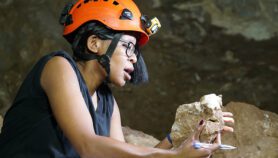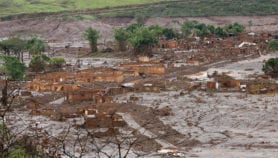By: Aisling Irwin
Send to a friend
The details you provide on this page will not be used to send unsolicited email, and will not be sold to a 3rd party. See privacy policy.
[ROME] Several globally renowned research programmes that have supplied much of the world’s scientific knowledge on environmental change are to be brought together under an overarching strategy, in what is being billed as an "unprecedented mobilisation" of science to help cope with rapid global change.
The World Climate Research Programme, the International Geosphere-Biosphere Programme, the International Human Dimensions Programme, and DIVERSITAS: An International Programme of Biodiversity Science, will form part of an integrated strategy on researching environmental change that will include social sciences.
Together they will work under a single framework for global environmental change research, to be known as the Earth System Sustainability Initiative (ESSI).
Scientists from national scientific bodies representing 140 nations, and 30 international scientific unions, voted yesterday (28 September) to approve the move, which they say is urgently needed to deliver fast and relevant scientific information for human development in the face of multiple threats to the planet.
"There is a very dramatic message coming out of science," Johan Rockström, executive director of the Stockholm Environment Institute and Stockholm Resilience Centre, Sweden, told the General Assembly of the International Council for Science (ICSU), held in Italy this week (27–30 September).
Displaying graphs charting the rise in species loss, freshwater use, tropical forest loss, fish stock depletion, ocean acidification, carbon dioxide levels and other aspects of damage to planetary systems, he pointed out that they all follow identical, ‘hockey stick’ curves, in which an exponential rise began towards the end of the 20th century.
"We have this multiple pattern of exponential pressures on the planet," Rockstrom told the meeting. "Every graph looks the same on every element essential for economic development [and all other measures of progress]," he said, adding that climate change was only one of nine planetary ‘boundaries’ whose transgression could spell disaster.
"Now science needs to step up one more notch to deliver answers to the questions the globe needs to answer in the next decade."
The shake-up, driven by ICSU, the International Social Science Council and the Belmont Forum (a group of many of the world’s leading funders of environmental change research) and some UN bodies, was unanimously agreed at the ICSU meeting, although some representatives of the programmes argued for a slower pace of change.
ICSU says the new, ten-year ESSI programme will be "structured as a cutting-edge global research network, which is highly integrative, flexible and responsive".
"There is more and more evidence that we need integrated science," Röckstrom, who co-chairs the team that is overseeing the design and early implementation of the initiative, told SciDev.Net.
"It’s not enough now to do disciplines on their own. We need to reduce the uncertainties, fill the gaps and improve forecasts, and this can only be done through interaction."
The critical outcome, he added, was the knowledge that societies need to develop in a landscape of environmental risk. This required natural scientists to work alongside social scientists and economists.
Pooling the infrastructures and secretariats of programmes, for example, would strengthen their overall impact — for example by creating a single voice for communicating messages to policymakers, he added.
It is also hoped that the new structure will attract more research funding.
Maria Uhle, a programme director in the geosciences directorate of the US National Science Foundation, said that the new approach would also avoid duplication of research, and reduce the dependence of international teams of scientists on funding approvals from an array of host countries to get a project off the ground.
The initiative will be formally launched in two stages — first at the Planet Under Pressure conference in the United Kingdom (26–29 March 2012), and then at the Rio+20 UN Conference on Sustainable Development in Brazil (4–6 June 2012).
A transition team will put together an implementation plan by November 2012.













